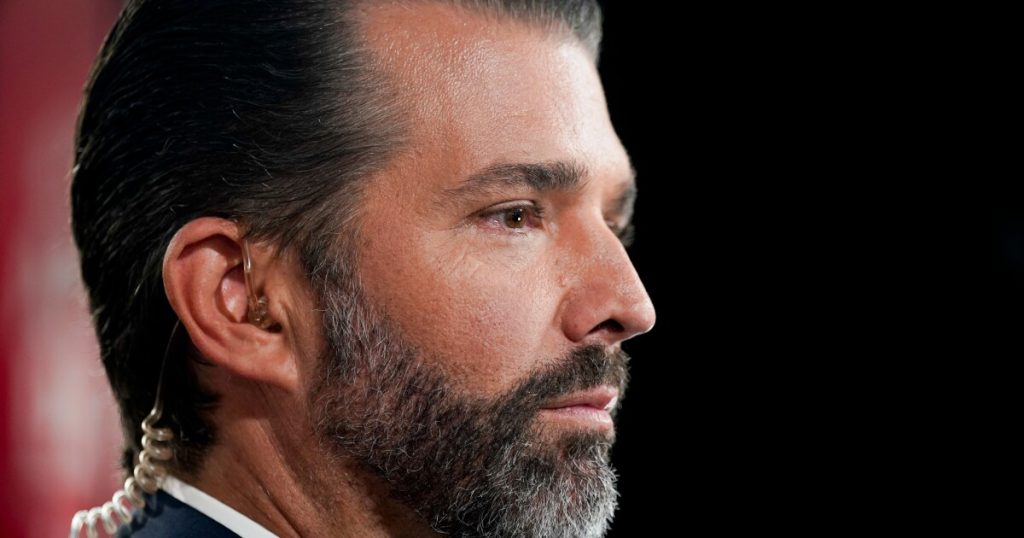The Trump family has again excited investors on Wall Street as the president-elect’s oldest son joined the board of directors of a fledgling payments company.
Donald Trump Jr. joined the board of directors of PSQ Holdings, the parent company of PublicSquare, today, according to the company. Willie Langston, a partner with Corient, a Houston-based asset management and advisory firm, also took a seat on the board.
“[Trump Jr.] has been an investor in PublicSquare since before our IPO, and [Langston] invested in our most recent PIPE offering in October 2024,” said Michael Seifert, chairman and CEO PublicSquare, in a statement. “[Trump Jr.’s] passion for creating a ‘cancel-proof’ economy, his years of strategic business experience, and his leadership within the shooting sports industry offer important expertise at the board level.”
PSQ Holding’s stock nearly quadrupled following the announcement, rising 270.4%, or $5.57, to $7.63 as of market close on Tuesday in New York. The company has a market capitalization of $250.3 million. Banking stocks
Palm Beach, Florida-based PublicSquare was founded in February 2021 on the promise of connecting Christian businesses with Christian consumers, allowing them to “shop their values,” according to the company. The company went public in July 2023 through a reverse IPO with Colombier Acquisition Corp. Today, 67% of voting rights are held by Christian shareholders, the company said.
“Having been involved from the earliest days of the company, I am thrilled to join the PublicSquare board of directors,” said Trump Jr. in a statement. “With a rapidly growing marketplace and payments ecosystem, PublicSquare has a distinct position in the market based on the core tenets of our nation’s founding, paired with a results-driven management team.”
PublicSquare since its founding has worked to position itself as a defender of Christian values amid increased discussion of “cancel culture” in American commerce and politics, and has put payments at the center of its strategy. In early March, PublicSquare tapped Klarna’s former North America CEO Brian Billingsley as president of its payments subsidiary, PSQ Payments, according to a company release.
The company has also taken the firearms industry under its wing with the March all-equity acquisition of Credova Holdings, a point-of-sale financing platform providing
The company has been vocal about its Christian ethos in other areas, too. Seifert, the company’s founder and CEO, in October joined The Dr. James Dobson Family Institute in a lawsuit filed with the U.S. District Court for the Northern District of Texas over mandates from the Equal Employment Opportunity Commission and the Department of Health and Human Services that require employers to provide healthcare coverage that includes women’s reproductive and gender-related care.
“Our Christian values influence almost everything we do at PublicSquare,” Seifert said in a statement. “These ethics inform our business, including how we source merchants and communicate with Christian audiences about PublicSquare’s services.”
PublicSquare’s meteoric rise today comes in an “increasingly politicized environment,” said Aaron McPherson, principal at AFM Consulting. “I don’t doubt that there’s demand for some people to ‘shop their values.’ You know, you see [canceling efforts] on the left. There’s efforts to boycott companies like Chick-Fil-A that are known for supporting conservative causes. This looks like a similar kind of thing on the right. So it’s not unprecedented.
“From a payments industry standpoint, I think the threat of being canceled is somewhat overblown,” McPherson said.
Whether PublicSquare can keep its momentum remains to be seen. Politically focused companies – with the exception of the media – are often difficult to sustain no matter which side of the aisle they take, said Aaron Press, research director of worldwide payment strategies at IDC.
“The audience tends to be more limited than the founders expect, and by nature these businesses exclude a significant share of the total market,” Press said. “The cultural or policy trends these companies are reacting to tend to change, rendering them less relevant. I would not expect a payments business to be meaningfully different. And if the merchants they intend to serve are also politically focused, the challenges are compounded.”
